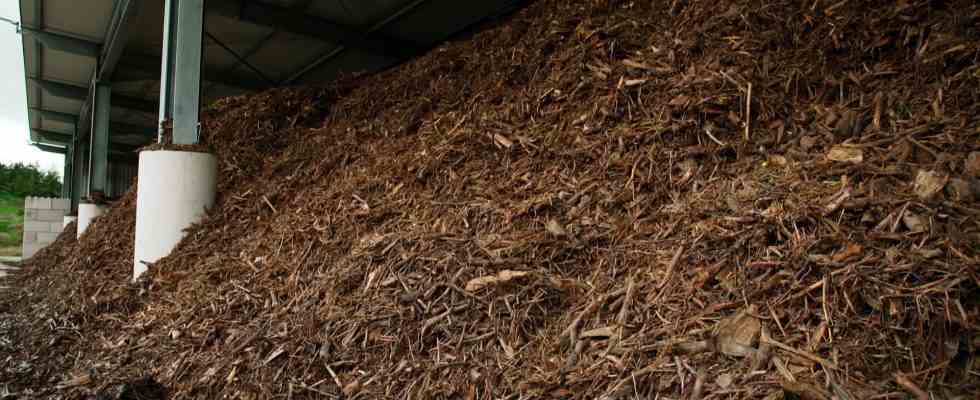Status: 03/10/2023 4:35 p.m
More renewable energies: Climate protection manager Uhle has been working on this for more than two decades in the Rhein-Hunsrück district. He made the district famous – far beyond Germany.
In Simmern in the Rhein-Hunsrück district, every page counts: Huge heaps of cut trees and shrubs accumulate on the premises of the Kirchberg heating plant. Sorted, dried and shredded, the masses pile up. It smells musty. But there is a lot of energy in the supposed waste: 38 public buildings in the Rhein-Hunsrück district are now heated with this biomass, including schools, swimming pools and retirement homes.
Climate protection in the Hunsrück
Christoph Würzburger, SWR, tagesschau24 2:00 p.m., March 10, 2023
The Rhein-Hunsrück district has been one of the zero-emission districts since 2018: “We started out very small with energy saving and the use of renewable energies. And every success we then had made us bolder,” remembers Michael Uhle. The trained architect has been working as a climate protection manager in Simmern for over two decades. The successes are clearly measurable: within 28 years, the district has reduced its CO2 emissions in the heat, electricity and waste sectors from almost 700,000 tons to zero.
Climate protection managers
Climate protection in municipalities is a cross-sectional task. It is made up of different fields of action, such as energy supply, mobility or urban development. “Climate protection managers are responsible for strategically anchoring municipal climate protection. In all fields of action, a plan must also be drawn up on how to implement the climate goals, i.e. the reduction of greenhouse gases. And for this, all the threads come together with the climate protection officers,” explains Corinna Altenburg from the German Institute for Urban Studies in an interview with the climate time. In the meantime, the majority of the districts have filled a position for climate staff, mostly with a woman: geographers, urban planners or engineers. “The municipalities that have hired climate managers save up to nine times more greenhouse gases. So it’s actually worth it,” says the expert.
International guests in Simmern
The climate balance in the Hunsrück is unique. That draws a lot of attention. Everyone wants to learn from the long-term recipe for success in the district. That is why climate protection manager Uhle gives lectures for international groups.
After a three-year pandemic break, people from 54 countries around the world came to the small simmer. Professors and scholars from all continents. Among them a very special guest: Jean Gervais Tchiffi Zaé, an African tribal king of the Krou people from the Ivory Coast in West Africa.
The trained architect Michael Uhle has been working as a climate protection manager in Simmern for over two decades
Image: SWR
Royal visit
Wearing a dark robe with a golden hem and a crown, His Majesty enters the council chambers of the district administration. “My dear man, we haven’t had that either! We’ve had princes before, but a king like that?” Uhle says, slightly excited. District Administrator Volker Boch welcomes the guest of honor before climate protection manager Uhle begins his presentation on the climate protection projects. “Why should we give our money to Putin or Saudi Arabia?” Uhle asks and tries to encourage the high-ranking guests and decision-makers to move away from fossil fuels in their respective countries.
Jean Gervais Tchiffi Zaé, an African tribal king of the Krou people from the Ivory Coast in West Africa, giving a lecture in Simmern.
Image: SWR
His lecture is well received by the audience. “It is an environmentally friendly approach, because other technologies are destructive and have no future, are not sustainable. But renewable energy – the name says it all: Renewable! It can be renewed over generations,” sums up Askwar Hilonga, university professor and Operator of a solar hotel from Arusha in Tanzania.
A wheel loader at the collection point of tree and shrub cuttings.
Image: SWR
Between musty heaps
After the lecture, the group visits the organic waste fermentation plant of “Rhein-Hunsrück Entsorgung”. And the collection point for tree and shrub cuttings is also on the tour plan. In the midst of the stinky heaps, climate protection manager Uhle explains the advantages of a local circular economy to his royal visitor and the many other guests from all continents.
Shrub pruning in the hands of climate manager Uhle.
Image: SWR
They have been using the chopped residual wood for heating for ten years. That saves a million liters of heating oil – every year. The king is enthusiastic: “What we see here, we also have in Africa. I can use this system to help Africa become economically independent. That makes me very happy. My plan is to open a new city in Africa found: the new Eldorado to help our continent. We will use the natural resources that God gives us.”
Uhle is also visibly satisfied, because his big idea of the energy transition is growing – not only in the Hunsrück: “You can find soul mates all over the world. They can come from the other half of the world and have the same dreams and visions as we do. They work with us the same images and that’s what fascinates you.”

